Catholic Women on the Frontlines of Global Health
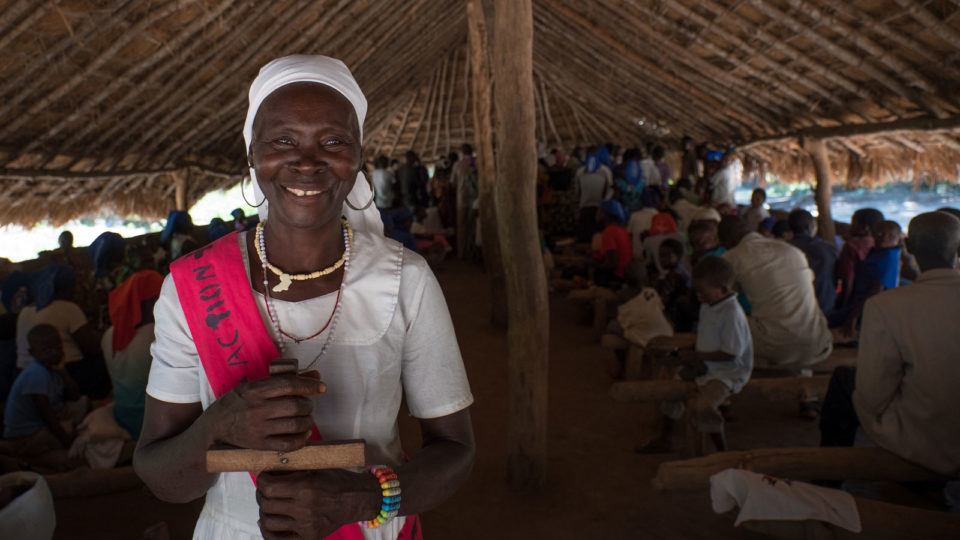
Mary Beth Powers, President and CEO of CMMB, lead a panel discussion of Catholic women in global health as they work to bring increased access to health care to poor, vulnerable communities around the world. Hosted by St. Ignatius Loyola parish church in New York on February 8th, the webinar invited visitors to explore the important role of women as agents of peace and trust in the world during the COVID-19 pandemic.
Mary Beth Powers was joined on the panel by Dr. Claudia Llanten, senior specialist in maternal and child health at CMMB, and Darnelle Bernier, Vice President of CMMB Medical Donations Program. The panel was moderated by Jana I. Cuggino, CMMB Board Member and Head of Strategy and Marketing at KPMG Healthcare and Life Sciences.
The panelists discussed the place Catholic women have today in the field of global health and how women are changing lives and putting their faith into action.
Click here to see the entire hour-long discussion.

Catholic Women Leading in Senior Management and in the Field
Women are the cornerstone of the international humanitarian community. Women represent 70% of the global health workforce, but they make up only 25% of global health leadership. “The tide is turning,” said Mary Beth Powers. “This is important since our focus is the health of women and children.” As the first woman to lead CMMB, Mary Beth joined a senior management team made of 50% women. Within CMMB’s country office partners, 3 out of 5 country directors are women.
“The tide is turning.” —Mary Beth Powers
“When working with the poor and the vulnerable, where solutions are sought for families,” said Darnelle Bernier. “I do see it as an advantage to bring a woman’s perspective to inform programs and innovations in approaches to address those challenges.”
CMMB still has work to do in closing the gender gap in global health. “Even when women are the leaders, there are often gaps of women on the management teams in some countries,” said Mary Beth. “There is still work to be done and women need the training and then mentoring to change the numbers.”
In global health, women are also the centerpiece of their communities. In health facilities, these women are nurses, midwives, or medical doctors. In the community, women are community health workers and health educators. “At CMMB, we deeply value the role of community health workers, which are women in its majority,” said Dr. Claudia Llanten. “In all of the five countries where CMMB works, community health workers are the foundation for the provision of primary health care.”
Catholic Social Teaching: Putting Faith Into Action
CMMB is guided by the principles of Catholic social teaching. The dignity of the human person and common good for society are foundational. Catholic social teaching is founded on the life and words of Jesus Christ. “Our mission states it upfront,” said Mary Beth. “CMMB is inspired by the example of Jesus. We carry that with us as we approach the work.”
A key Catholic social teaching for CMMB is the principle of subsidiary. Subsidiarity suggests that decision making should be delegated as close as possible to the people affected by the decisions —nothing about us without us.
“This is very much in our approach to the work at CMMB,” said Mary Beth. “We are really trying to empower local people to lead on solutions to their specific health issues, whether that is how to prevent the deaths of mothers and newborns during pregnancy and child birth and those first few days and weeks when babies are most vulnerable, or to reduce childhood deaths due to infectious diseases.”
“I am buoyed by the faith I have and the faith I witness in the communities I have visited.” —Darnelle Bernier
Faith can move mountains. It has been an inspiration for Catholic women at CMMB to do their best by contributing to something greater than themselves for the greater good — delivering locally sustainable, quality health solutions to the poorest of the poor. “The poverty I’ve seen can at times be overwhelming,” said Darnelle Bernier. “I am buoyed by the faith I have and the faith I witness in the communities I have visited.”
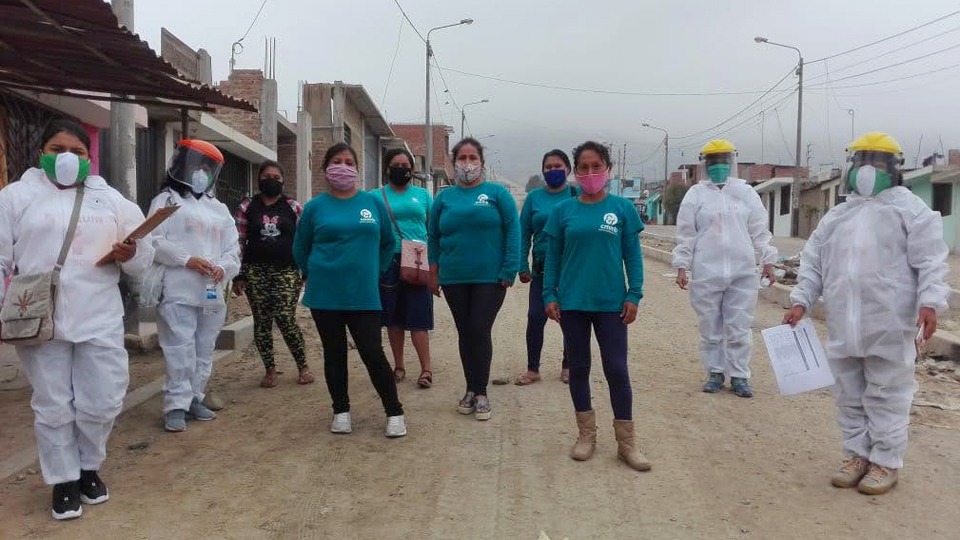
Community heath workers wearing PPE as part of COVID-19 response in Peru.
Community Health Workers Responding to COVID-19
Women are on the frontlines of global health, and have been especially important in the fight against COVID-19. Women make up the vast majority of health workers and have been at the forefront of the pandemic response.
“Women are on the frontlines of our COVID-19 response. From Haiti and Peru to Kenya, South Sudan, and Zambia, our community health workers are primarily women,” said Mary Beth. “Protecting the most vulnerable against COVID-19 is aligned with Catholic social teaching.”
“Protecting the most vulnerable against COVID-19 is aligned with Catholic social teaching.” —Mary Beth Powers
Community health workers are key to the provision of essential, life-saving interventions such as childhood immunizations, reaching women for safe pregnancies and childbirth services for mothers, access to treatment for HIV/AIDS, malaria and health promotion of water and sanitation.
The evidence shows that community health workers can add significantly to the efforts of improving the health of the populations. For example, community health workers in Zambia have helped to increase the identification of pregnant women in the first trimester so they can receive at least four antenatal care visits. In South Sudan, community health workers have contributed to the increased adherence to HIV prevention and treatment of mother-to-child transmission.
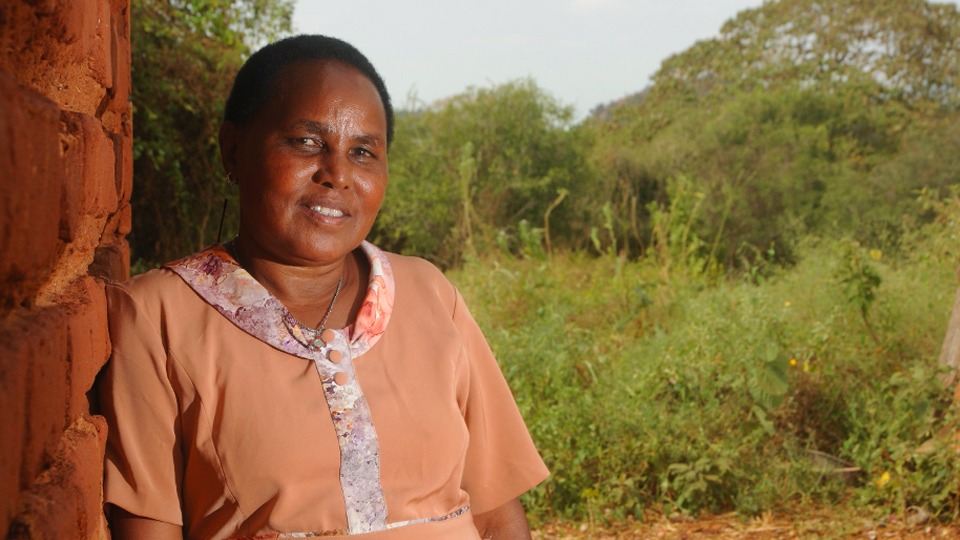
CMMB trained Nurse Mary to conduct cervical cancer screenings for her community in Kenya.
During COVID-19, community health workers have become all the more critical.
At the onset of the pandemic, CMMB launched an emergency response to protect vulnerable populations. CMMB is equipping health facilities with critical supplies and training community health workers to build resilience and help stop the spread. In 2020 alone, 817 healthcare workers and 1,140 community health workers received COVID-19 training. CMMB provided 248 health facilities with supplies, including personal protective equipment.
Clean water and handwashing have become even more critical to slow the spread of COVID-19 and save lives. In 2020, CMMB expanded its clean water projects in local communities and health facilities. “The lack of access to clean water and basic sanitation is one of the greatest inequalities and most absurd continuing challenges that I have seen,” said Mary Beth. “In fact, 1 in 4 health facilities in the world do not have a consistent source of clean water.”
“The lack of access to clean water and basic sanitation is one of the greatest inequalities.” —Mary Beth Powers
In 2020, CMMB expanded its clean water projects in local communities and health facilities to improved access to clean water for 261,811 people. From building handwashing stations and rainwater catchment systems to installing indoor plumbing in health facilities and providing water purification packets to people, CMMB’s clean water investments during the pandemic will have a life-saving impact for years to come.
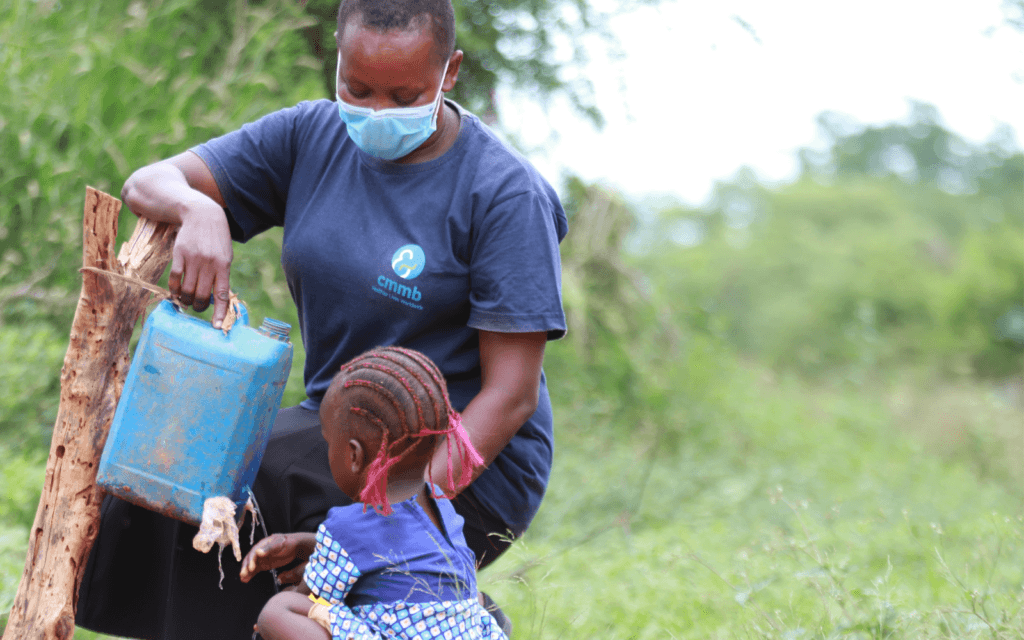
Community health worker named Ndunge showing a child how to wash her hands with clean water using a tippy tap.
CMMB’s community health workers play a large role in these projects. During home visits, they educate families about the health benefits of clean water and connect them to health facilities for care. They ensure that community members are trained on how to maintain their new water systems — building local capacity and ensuring long-term access to clean water.
“In the era of COVID, is it imaginable that a health worker could not wash their hands at work?” asked Mary Beth. “So, that is the kind of things that motivates me to do more and continue talking about the challenges that frontline health workers face around the world.”
Increasing Access to Quality Medicines Worldwide
CMMB’s Medication Donations Program works to increase access to quality medicines worldwide and equip health facilities to provide care to the poorest patients—including when disasters and humanitarian crises strike, like COVID-19.
In partnership with leading pharmaceutical companies and trusted local partners on the ground, CMMB delivers medicine free-of-charge to the most vulnerable people in the world. In 2020 alone, CMMB delivered nearly half a billion dollars worth of medicines and medical supplies to 52 health partners in 31 countries. From treating breast cancer in war-torn Syria to delivering PPE during the pandemic, the Medical Donations Program has been lifesaving and a foundation of CMMB’s work.
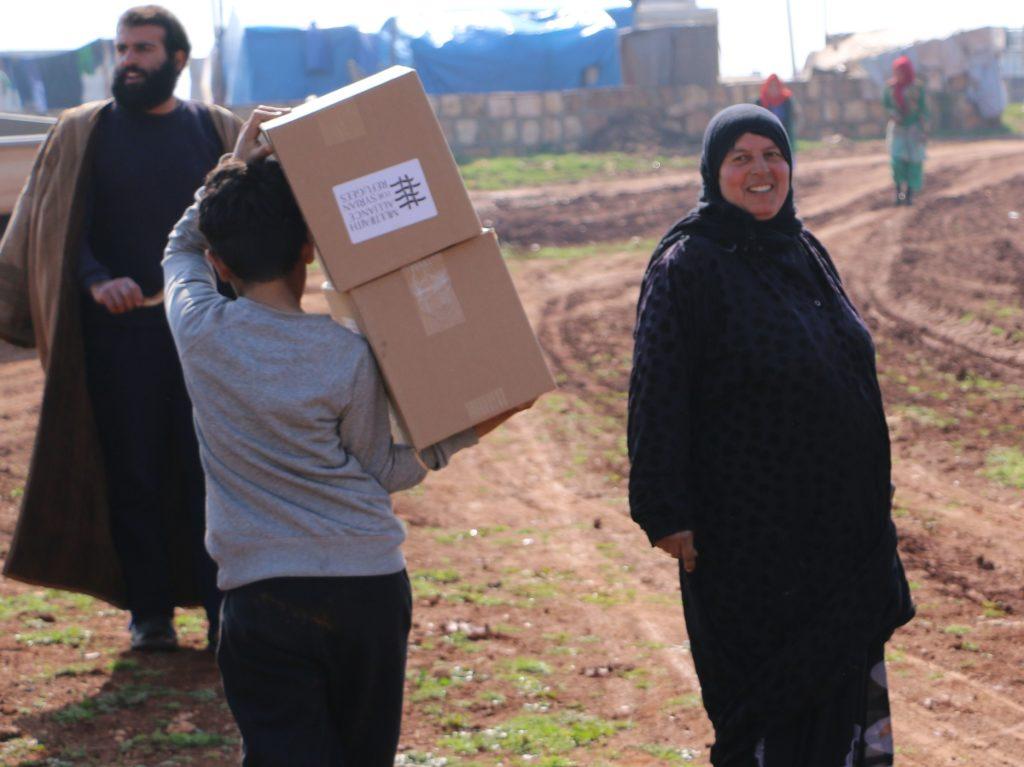
On top of the daily challenges living in war-torn Syria, Fatima has breast cancer. CMMB provided her with lifesaving medicines through its Medical Donations Program.
“The Medical Donations Program was a natural pairing with the organization’s medical mission work,” said Darnelle Bernier. “An anesthesiologist, Dr. Paluel Joseph Flagg, founded CMMB in 1912 with his medical mission work in Haiti and his call to others to support medical missions in India and China.” It was then Father Venerable Fulton J. Sheen who helped to connect CMMB’s medical donations workwith pharmaceutical manufactures. By the mid-40s, CMMB was engaging the pharmaceutical sector to donate medications for distribution in the developing world, and this partnership continues still today.
“We have distributed donations with partners in over 120 countries,” said Darnelle Bernier. “Our current partners count over 3,000 health facilities in their networks.”
“We have distributed donations with partners in over 120 countries.” —Darnelle Bernier
“On our site visits, we have spoken both with healthcare workers and community health volunteers who have shared the decisions that must be made regarding medication and supplies they can afford with their budgets, and the products they must forgo,” said Darnelle Bernier. “Donations are a help in defraying costs or providing medication that is otherwise unavailable.”
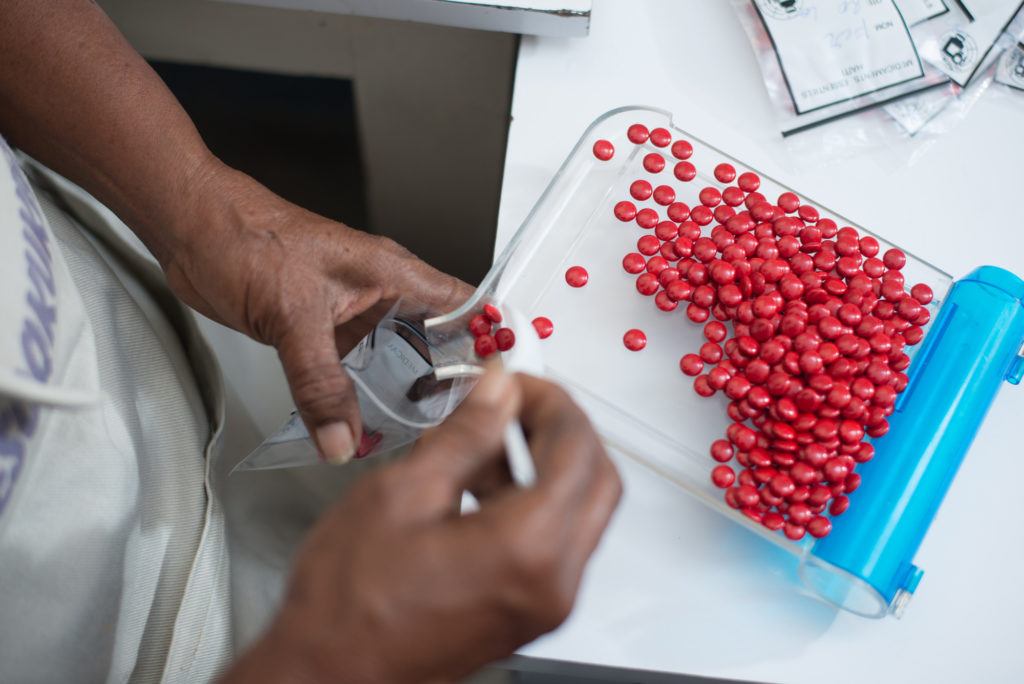
In 2020 alone, CMMB delivered nearly half a billion dollars worth of medicines and medical supplies to 52 health partners in 31 countries.
Catholic Women: Helping Shift the Paradigm
The pandemic has showcased that Catholic women are at frontlines of global health. Catholic women leaders at CMMB each bring the whole of their experiences and selves to bear in setting strategy, developing others, identifying solutions and overseeing programmatic outcomes.
“As a Catholic woman leader, I know that there is a history of so many religious women in service and in advocacy,” said Mary Beth. “I feel blessed to get to do a small part alongside women leaders and following in the footsteps of women who created large efforts to serve the poor like Mother Teresa, or Elizabeth Ann Seton.”
“We bring humbleness and warmth, empathy and resilience.” —Dr. Claudia Llanten
“We start our work by listening to the others, by bringing all voices close to each other, especially for those who need to listen,” said Dr. Claudia Llanten. “We work close to reality, trying to understand people’s context. When there is a problem, many times we are part of the solution. We bring humbleness and warmth, empathy and resilience.”
CMMB sincerely thanks St. Ignatius Loyola parish church and Father Michael P. Hilbert for presenting the event. In addition, CMMB thanks Jana I. Cuggino for moderating such an insightful discussion on the importance of Catholic women in global health.